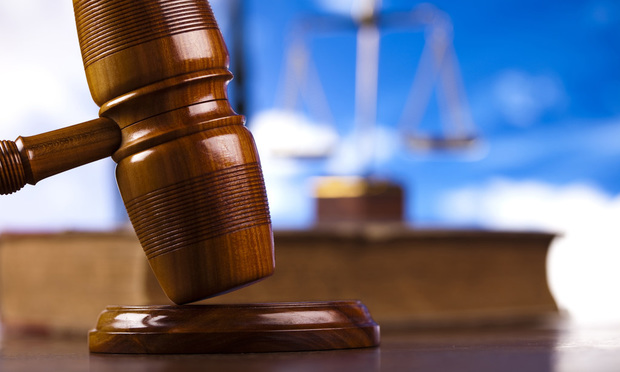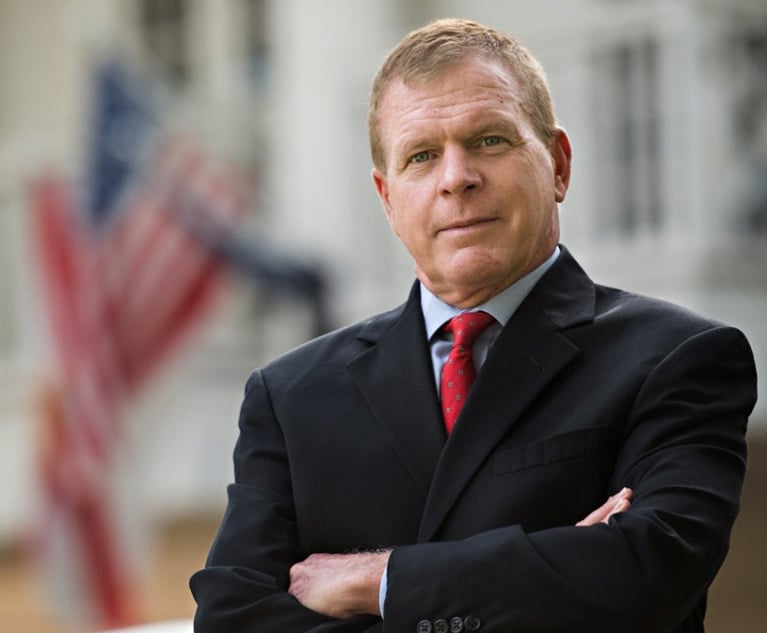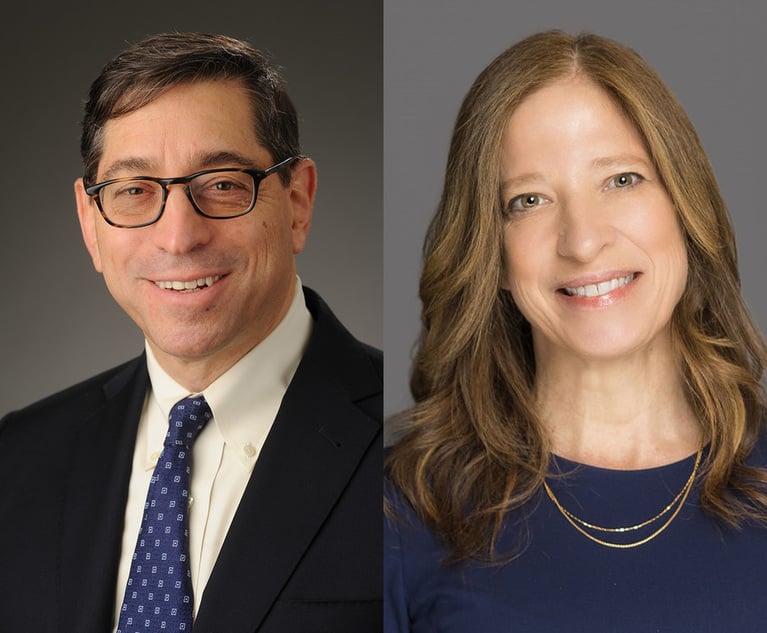How to Identify Bias in the Courtroom
Lawyers will enjoy more success in their practice by acknowledging, rather than ignoring, the natural biases of the participants and developing a practical understanding of bias in their practices.
April 30, 2018 at 05:45 PM
5 minute read

In the age of the vanishing jury trial, “litigators” spend a small fraction of the time in the courtroom that their predecessors did in decades past. With so few jury trials, lawyers have become tone deaf to the nuances of bias that pervades trial practice.
Some proponents of tort reform have argued against jury trials, as if some utopian policy could purge dispute resolution of all bias. Yet psychologists have identified many types of biases and as well as many other shortcuts people use in everyday decisions that trial lawyers should understand. For example, a landmark 1954 article, “They Saw A Game,” published in the Journal of Abnormal and Social Psychology, addressed the emerging study of biases in its evaluation of wildly divergent opinions about who played dirty and who played clean in a football game. The authors' analysis applies equally to trials:
“Like any other complex social occurrence, a 'football game' consists of a whole host of happenings. … [E]ach happening is a link in a chain of happenings, so that one follows another in sequence. … The 'game' 'exists' for a person and is experienced by him only in so far as certain happenings have significances in terms of his purpose. Out of all the occurrences going on in the environment, a person selects those [who] have some significance for him from his own egocentric position in the total matrix.”
Trial lawyers should keep this concept in mind at each stage of a dispute.
The judge: Addressing bias is begins with the judge. Legal-writing expert Bryan Garner observes in his 2015 ABA Journal article, “The Psychology of Credibility,” that judges use a bias (or at least a rule of thumb) of the “halo effect” when reading briefs. Citing psychology research that “people who are cognitively busy” are likely to make “selfish choices” and “superficial judgments,” Garner observes that judges make snap judgments about cases based on the clarity, length and even citation form in a brief.
Voir dire: Every jury trial presents the opportunity to explore bias in voir dire, and the experience of voir dire from prior cases affects a lawyer's assessment of it in future cases. Many states, such as Texas where I practice, allow lawyers to examine potential jurors directly, and if lawyers honor that privilege with focused, relevant and open-ended questions that encourage jurors to talk, the results can help focus the trial and even cause it to settle. Texas courts, for example, will excuse jurors for cause if the juror's view or feeling about an important issue rises to a fixed state of mind, loosely described as a “prejudice.” A mere “bias,” on the other hand, is viewed as an “inclination” that may justify a peremptory challenge (of which lawyers have a limited number) but not a for-cause challenge (for which the number is unlimited). As the Texas Supreme Court observed in Cortez v. HCCI–San Antonio (1995), “the relevant inquiry is not where jurors start but where they are likely to end. An initial leaning is not disqualifying if it represents skepticism rather than an unshakeable conviction.”
Direct examination: Bias extends to direct examination as lawyers present testimony. Lawyer and client should begin their preparation for direct examination by considering the likely perspective of the jurors, and should bear in mind the advice of Nobel laureate Richard Feynman in his 1974 commencement address to the graduating class at the California Institute of Technology: “The first principle is that you must not fool yourself—and you are the easiest person to fool.” Likewise, when calling an expert witness, be sure that expert's testimony provides genuine help to the jury, judge or arbitrators. Expert testimony that fails to do so is easily discounted, no matter what the price tag, and often because of the price tag. They may conclude, in the words of Upton Sinclair, that “it is difficult to get a man to understand something, when his salary depends upon his not understanding it.”
Cross-examination: Confronting bias is a key function of cross-examination. Bias is always admissible; it is never collateral, as the U.S. Supreme Court held in Davis v. Alaska (1974). In criminal and quasi-criminal proceedings, the accused has a constitutional right under the Fifth Amendment to confront witnesses, including as to bias. A textbook example of the impact of bias evidence occurred in the trial of William Kennedy Smith, who was accused of raping a woman twice, once while his uncle, Sen. Edward M. Kennedy, allegedly watched. As reported in a 1991 New York Times report by David Margolick, Smith's lawyer confronted a key witness for the alleged victim that had received $40,000 from the program “A Current Affair” for two interviews. At that revelation, a gasp went up, prompting the judge to threaten to clear the gallery. The jury acquitted Smith in all charges.
Closing argument: Summing up to the jury allows the trial lawyer to bring the biases to bear on the jury's core function of deciding the greater weight of the credible evidence. You will also want to arm them for deliberations: to use what you have learned about the jurors' biases against your side to overcome their concerns, and to arm the jurors who are with you to use their biases and to overcome the concerns of the jurors against you.
In sum, lawyers will enjoy more success in their practice by acknowledging, rather than ignoring, the natural biases of the participants and developing a practical understanding of bias in their practices.
David K. Bissinger is a trial lawyer and partner in Bissinger, Oshman & Williams in Houston.
This content has been archived. It is available through our partners, LexisNexis® and Bloomberg Law.
To view this content, please continue to their sites.
Not a Lexis Subscriber?
Subscribe Now
Not a Bloomberg Law Subscriber?
Subscribe Now
NOT FOR REPRINT
© 2025 ALM Global, LLC, All Rights Reserved. Request academic re-use from www.copyright.com. All other uses, submit a request to [email protected]. For more information visit Asset & Logo Licensing.
You Might Like
View All

Restoring Antitrust: Returning to the Consumer Welfare Standard

New York Mayor Adams Attacks Fed Prosecutor's Independence, Appeals to Trump
5 minute read
Trending Stories
- 1Gunderson Dettmer Opens Atlanta Office With 3 Partners From Morris Manning
- 2Decision of the Day: Court Holds Accident with Post Driver Was 'Bizarre Occurrence,' Dismisses Action Brought Under Labor Law §240
- 3Judge Recommends Disbarment for Attorney Who Plotted to Hack Judge's Email, Phone
- 4Two Wilkinson Stekloff Associates Among Victims of DC Plane Crash
- 5Two More Victims Alleged in New Sean Combs Sex Trafficking Indictment
Who Got The Work
J. Brugh Lower of Gibbons has entered an appearance for industrial equipment supplier Devco Corporation in a pending trademark infringement lawsuit. The suit, accusing the defendant of selling knock-off Graco products, was filed Dec. 18 in New Jersey District Court by Rivkin Radler on behalf of Graco Inc. and Graco Minnesota. The case, assigned to U.S. District Judge Zahid N. Quraishi, is 3:24-cv-11294, Graco Inc. et al v. Devco Corporation.
Who Got The Work
Rebecca Maller-Stein and Kent A. Yalowitz of Arnold & Porter Kaye Scholer have entered their appearances for Hanaco Venture Capital and its executives, Lior Prosor and David Frankel, in a pending securities lawsuit. The action, filed on Dec. 24 in New York Southern District Court by Zell, Aron & Co. on behalf of Goldeneye Advisors, accuses the defendants of negligently and fraudulently managing the plaintiff's $1 million investment. The case, assigned to U.S. District Judge Vernon S. Broderick, is 1:24-cv-09918, Goldeneye Advisors, LLC v. Hanaco Venture Capital, Ltd. et al.
Who Got The Work
Attorneys from A&O Shearman has stepped in as defense counsel for Toronto-Dominion Bank and other defendants in a pending securities class action. The suit, filed Dec. 11 in New York Southern District Court by Bleichmar Fonti & Auld, accuses the defendants of concealing the bank's 'pervasive' deficiencies in regards to its compliance with the Bank Secrecy Act and the quality of its anti-money laundering controls. The case, assigned to U.S. District Judge Arun Subramanian, is 1:24-cv-09445, Gonzalez v. The Toronto-Dominion Bank et al.
Who Got The Work
Crown Castle International, a Pennsylvania company providing shared communications infrastructure, has turned to Luke D. Wolf of Gordon Rees Scully Mansukhani to fend off a pending breach-of-contract lawsuit. The court action, filed Nov. 25 in Michigan Eastern District Court by Hooper Hathaway PC on behalf of The Town Residences LLC, accuses Crown Castle of failing to transfer approximately $30,000 in utility payments from T-Mobile in breach of a roof-top lease and assignment agreement. The case, assigned to U.S. District Judge Susan K. Declercq, is 2:24-cv-13131, The Town Residences LLC v. T-Mobile US, Inc. et al.
Who Got The Work
Wilfred P. Coronato and Daniel M. Schwartz of McCarter & English have stepped in as defense counsel to Electrolux Home Products Inc. in a pending product liability lawsuit. The court action, filed Nov. 26 in New York Eastern District Court by Poulos Lopiccolo PC and Nagel Rice LLP on behalf of David Stern, alleges that the defendant's refrigerators’ drawers and shelving repeatedly break and fall apart within months after purchase. The case, assigned to U.S. District Judge Joan M. Azrack, is 2:24-cv-08204, Stern v. Electrolux Home Products, Inc.
Featured Firms
Law Offices of Gary Martin Hays & Associates, P.C.
(470) 294-1674
Law Offices of Mark E. Salomone
(857) 444-6468
Smith & Hassler
(713) 739-1250








